- Home
- David McCullough
The American Spirit Page 5
The American Spirit Read online
Page 5
With few exceptions, they’ve all done a good deal of complaining about the job and professed no liking for it. It was so from the very beginning. George Washington went to his place at the head of the new government, “accompanied,” he said, “by feelings not unlike those of a culprit who is going to the place of his execution.” John Adams, Washington’s successor, describing his inauguration to his wife, Abigail, wrote, “A solemn scene it was indeed and it was made more affecting to me by the presence of the General [Washington], whose countenance was as serene and unclouded as the day. Me thought I heard him say, ‘Aye, I am fairly out and you are fairly in. See which of us is the happiest.’ ”
Jefferson famously declared the presidency a “splendid misery.” Andrew Jackson called it “dignified slavery.” Polk said it was “no bed of roses.” Abraham Lincoln thought himself unfit for the role. Grover Cleveland told a very young FDR when they met, “Boy, I hope you will never, ever become president.” Harry Truman privately referred to the White House as “the great white jail.”
The first ladies of the land often took an equally dim view of the part they had to play and worried incessantly over the stress their husbands were under. Perhaps the most memorable of recorded declamations on the subject of the presidency was made by Bess Truman during her one and only press conference. I will read it to you verbatim. The questions, I should explain, were written in advance and she answered them before the “ladies of the press” who were invited to the White House.
“What qualities did she think would be the greatest asset to the wife of a president?”
“Good health and a well-developed sense of humor.”
“Do you think there should ever be a woman President of the United States?”
“No.”
“Would you want to be President of the United States?”
“No.”
“Would you want Margaret ever to be First Lady?”
“No.”
“If she had a son, would you try to bring him up to be President?”
“No.”
“If it had been left to your own free choice, would you have gone into the White House in the first place?”
“Most definitely not.”
“What was her reaction to the musical criticism of Margaret singing?”
“No comment.”
“Did any of the demands of her role as first lady ever give her stage fright?”
“No comment.”
“What would you like to do and have your husband do when he is no longer President?”
“Return to Independence.”
But the professed wish to go home again is also part of the tradition, going back to George Washington’s longing for Mount Vernon. They’ve nearly all longed to return to whence they came, or so they said. But then rare was the man who truly wished to let go of the office. Most would have fought to their last breath to stay if they could.
Only TR openly declared his love for the job. “Nobody ever enjoyed the presidency as I did,” he boasted, and by all evidence that was so. “While president I have been president emphatically,” he said.
It’s become commonplace to stress how the office has expanded. Yet the change is indeed startling.
When Jefferson was president he had a staff of somewhere between four and twelve people—in total. His salary, as it had been for Washington and Adams, was $25,000. Let me give you a few present-day statistics about the office. It pays $200,000 a year—taxable—but includes an annual expense allowance of $50,000, which is nontaxable. Then there’s an additional expense account of $12,000 for official entertaining.
The total payroll for the executive branch, which includes all cabinet-level positions and those departments, 2,750,000 people, comes to nine and a quarter billion dollars. The White House staff, that is, the immediate staff of the president—what in Jefferson’s day was a half dozen or so—is now 382 at a cost of $1,640,000.
The perks include a helicopter, Air Force One, and a fleet of thirty-five limousines. There is a White House swimming pool, tennis court, gymnasium, bowling alley, and in the Clinton years, a jogging track. The president also has two movie theaters, recording facilities, a library. There are riding horses supplied by the army, should he wish them, a private, armor-plated Pullman car, and some two thousand Secret Service agents on call for his protection.
He and his family live rent free, it should also be noted. Annual maintenance and operation of the house runs to eight million dollars and requires still another staff of more than a hundred maids, cooks, butlers, gardeners, and electricians. There is a Director of Systems Management for electronic mail, a Director of the Gift Unit, a Deputy Director of White House Gifts, a Manager of Data Entry Night Force, among others.
Then there’s Camp David, which several presidents have hardly used at all. Harry Truman, for instance, thought it boring and wanted never to go there. The cost of Camp David runs to about a million dollars a year.
One of the best indices of what’s happened to the scale of operations in recent years are the presidential trips to China, which have become obligatory. According to The New York Times, when President Nixon first went to China in 1972, his retinue numbered 300. Three years later, when President Ford made the trip, 450 went along. By 1984, when Ronald Reagan went, he took 600. Then came a temporary dip in the curve in 1989 when the number accompanying George Bush dropped back to 500. But in 1998 when Clinton made his trip, more than 1,000 went with him.
As John Steinbeck once wrote, “We give the President more work than a man can do, more responsibility than a man should take, more pressure than a man can bear.” But we also give him more power, far more power, than has been held by any mortal in all history and a commensurate lot of swash, the show of power, to go with it. No king of England, no oriental potentate of old ever arrived with a greater display of his importance than does the modern president of the United States—which is a long way from Thomas Jefferson walking to the Capitol for his inauguration.
The twentieth-century presidency begins with Theodore Roosevelt. He was like nobody who had ever been president before, and appeared on the scene just as the century was getting under way. Significantly, it was also just at the point when it became technically possible to reproduce photographs in newspapers and magazines. So immediately TR became the most photographed president in history until then—and usually in action, this made possible by improved camera technology. He was photographed with his family, photographed jumping his horse, hiking, playing tennis. James J. Hill, the railroad tycoon, who didn’t care for Roosevelt, said all he ever did was pose for pictures and draw his pay.
Theodore Roosevelt at the Panama Canal
Modern times caught up with the presidency then. TR was the first president to go down in a submarine, the first to go up in an airplane, the first to call it the White House, officially. Most importantly, he saw himself a world leader. America had no choice but to play a big part in the world, he preached.
He embraced the power of the presidency without hesitation, with open delight, and used it effectively and imaginatively. He said he liked power for what he could do with it.
Eager to display American sea power, he decided to send the fleet on a goodwill tour around the world. Told that Congress would refuse to appropriate the money, he said he had sufficient funds at hand to send the ships halfway; then it would be up to Congress to decide whether to bring them home again.
To many TR is the president who built the Panama Canal. He himself thought it was what he would be best remembered for. The canal was the biggest-ever American effort beyond our borders, a project of worldwide importance. In fact, it was one of the greatest American achievements in history, for which that whole generation rightfully took tremendous pride. No other country had either the will or the wherewithal to do such a mighty thing, it was said, or a man like the one in the White House to see that it was done right.
When TR went to Panama to inspect the work firsthand in 1906,
it marked the first time a president had ever left the country while in office. As might be expected, he went by battleship. The days he toured the “diggings” were among the happiest of his life and can be seen now as a kind of set piece—a president perfectly cast for his time. The spectacle, like nothing ever seen anywhere on earth before, was of American know-how, American machinery, American money and political power accomplishing what nature had neglected to provide, “the dream of Columbus,” a passage to India.
Roosevelt was photographed his every waking hour on the scene. It was the first great presidential photo opportunity in history. The picture has become a metaphor for the age. As possibly only he could, TR took the controls of a giant ninety-five-ton Bucyrus-Erie steam shovel, the most powerful thing of its kind ever built, while wearing a spotless white linen suit. And so there he is, the commander-in-chief at the helm of “the biggest work that’s ever been done,” as he told the Americans on the job.
But it should be remembered, too, that he’d “taken” the Isthmus, as he said, with a high-handed use of power against the nation of Colombia. As he said in a speech, “I took the Isthmus, started the canal and then left Congress not to debate the canal, but to debate me.” There’s a raw kind of arrogance to that. There’s also a raw truth to it. And the country, as it happened, loved it.
He was the most popular president we had had until then, and few since have had quite the same kind of hold on the popular imagination. He gave the country a good time just being himself. But importantly he used his popularity. He didn’t just want it for the sake of being popular. He wanted it to do things. It was power he could make use of.
At the time of the great Anthracite Coal Strike of 1902, he stepped in as no president had, brought the executive branch of the government into labor arbitration for the first time, settled the strike, and transformed labor relations thereafter.
But then he entered into nearly everything. He was ebullient, confident, full of ideas, interested in everything, seldom without a book. He read books, he wrote books. He wrote his own messages to Congress. He wrote his own speeches.
In nearly eight years in office he initiated the first successful antitrust suit against a corporate monopoly. He doubled the size of the navy, helped settle the Russo-Japanese War, established five national parks, including the Grand Canyon, and made conservation a popular cause for the first time.
It’s often remarked that the great presidents have been those who served in times of great crisis. And that might be taken as the rule were it not for the stunning exception of Theodore Roosevelt, who was president when there was no crisis, when, in fact, he could easily have coasted in the job, as some had done before him. But he was Theodore Roosevelt and that’s the point.
At the heart of history, and a great part of the pull of history, is the mystery of human nature. And human nature—individual personality, makeup, call it what you will—has to be reckoned as a prime force in any consideration of the presidency and its power.
You may remember the scene in Saint-Exupéry’s The Little Prince when the fox says that what’s essential is invisible. And so it is with this large subject of presidential power: To a very large extent it’s invisible.
It has to do with aspects of individual personality for which there are no ready measurements—the integrity of Washington, Lincoln’s depth of soul, the courage of Harry Truman. Or think of the charm of Kennedy at a press conference, or Ronald Reagan in front of a television camera in almost any circumstance.
Maybe if we could put presidential power in a pot and boil it all down, a big part of what we would find at the bottom would be language, the use of language, the potency of words. Power to persuade is power indeed and only a relative few of the presidents had it—Lincoln, TR, Woodrow Wilson, and Franklin Roosevelt. And JFK. His inaugural address didn’t just thrill the country then, it still does. The language transcends time.
Ronald Reagan
Franklin D. Roosevelt
Sometimes just a line—a single line—spoken by a president can do wonders. Think, for example, when at his inaugural Jimmy Carter said, “For myself and for our nation, I want to thank my predecessor for all he has done to heal our land.” What a moment it was for the country. It got the new Carter administration off to exactly the right start. The glow of good feeling wouldn’t last very long, but there it was and it was just right.
One of my favorite lines from an inaugural address is this—I wonder if you remember who said it? “How can we love our country and not love our countrymen? And loving them, reach out a hand when they fall, heal them when they’re sick, and provide opportunities to make them self-sufficient so they will be equal in fact and not just in theory.” It was said by Ronald Reagan.
And a further point about Kennedy that strikes me as refreshing: He almost never talked about himself. The first-person singular almost never entered into anything he said, in contrast to so many others since. It was a big part of his appeal, I think.
Theodore Roosevelt not only called the presidency the “bully pulpit,” he saw and demonstrated that the pulpit is the essence of the power of the office.
Harry Truman was saying much the same thing when, in a fit of exasperation, he tried to dismiss the whole notion of presidential power:
Aside from the impossible administrative burden, he, the President, has to take all sorts of abuse from liars and demagogues. The people can never understand why the president does not use his supposedly great power to make them behave. Well, all the President is, is a glorified public relations man who spends his time flattering, kissing and kicking people to get them do what they are supposed to do anyway.
Truman was neither brilliant nor eloquent. He did not have the gift to move the country with words, to lift us up to do something bigger, nobler, to rise to a “rendezvous with destiny,” the way his predecessor, Franklin Roosevelt, could. Roosevelt was extraordinary in that way through the worst depression in history and the most terrible of wars.
It was then, almost overnight as history goes, that the size, scope, the expenditures of government grew by geometric proportions, and with it the importance—or power—of the presidency. What is so difficult for many today to understand is that in the 1930s the United States was neither rich nor a military power. The army stood twenty-sixth in the world in strength, behind Switzerland and Argentina. And a good 40 percent of all the families in America were living on incomes of less than a thousand dollars a year. This, mind you, wasn’t two hundred years ago, but within the memory of many of us here in this room. The whole idea of a rich, all-powerful nation-state with a standing army surpassing that of any on earth is something relatively new to American life.
With Truman’s presidency in 1945 came the advent of nuclear weapons and the Cold War, the creation of the CIA, the National Security Council, a burgeoning Defense Department, NATO, and a fearsome, stepped-up arms race with the Soviets.
As Truman saw the presidency, the chief responsibility was to make decisions and he made some of the most difficult and far-reaching of any president. If not brilliant or eloquent, he was courageous and principled. The invisible something he brought to the office was character.
Harry and Bess Truman
He also demonstrated, and dramatically at times, what power—he would have said “authority”—rests with the president constitutionally, what a president can do by merely signing his name.
His most sensational and controversial decision was to fire General MacArthur, which was done on the perfectly sound premise, as set forth in the Constitution, that no one but the president is commander-in-chief of the armed forces. His subordinate, MacArthur, was disobeying orders, flagrantly—and indeed, if you go over the record, you wonder that Truman didn’t fire him sooner than he did. Outrage in the country was stupendous. MacArthur was an authentic American hero, the greatest American of his day, many passionately believed, and who was little Harry Truman to bring him down. The answer, of course, was that Harry Truman w
as president and in time the country would come to see that he had done the right thing, even in the face of seeing his popularity plummet.
Another notable example of courageous executive authority, and among Truman’s most admirable decisions—and again at great risk of his popularity—was the executive order that made segregation in the armed forces illegal. The year was 1948, you’ll remember, an election year. Friends and advisors warned that if he persisted in his civil rights program he was certain to lose in November. That being so, Truman responded, then he would be losing for a good cause. Again, as commander-in-chief, he had no need to go to Congress, he had only to take up his pen and he did.
Another, more recent, brave, and controversial exercise of presidential power was Gerald Ford’s decision to pardon Richard Nixon, which, to my mind, was also the right thing to have done—not for Ford’s political fortunes but for the country.
It should be said, too, it seems to me, that the power of the presidency and the long-range wisdom of several of our presidents may be found also in what they chose not to do. We don’t give enough credit to presidents for what they don’t do.
John Adams did not go to war with France at a time when a great part of the country was breathing fire for war. Politically it would have been Adams’s easy path and greatly to his advantage. But he knew a war was the last thing the struggling new country needed and so refused to go along and there was no war.
Truman didn’t use the atomic bomb in Korea in the face of tremendous pressure to do so. Eisenhower didn’t go into Vietnam. These were vastly important decisions.
Sometimes I wonder if we make too much of our presidents. Might it be better if we ignored them a little more than we do? But then on the other hand, I don’t think we can ever know enough about them, and particularly before putting them in the job. The truth is, of course, it makes an enormous difference who’s in the White House.

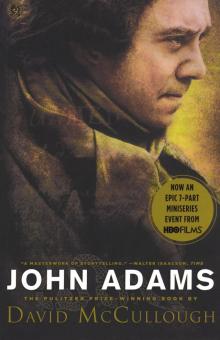 John Adams
John Adams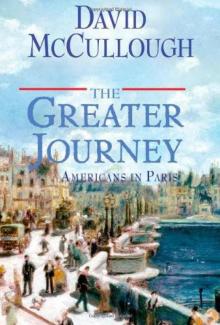 The Greater Journey: Americans in Paris
The Greater Journey: Americans in Paris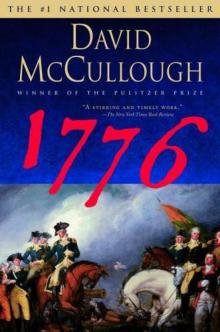 1776
1776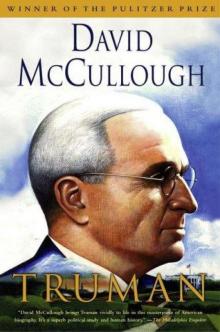 Truman
Truman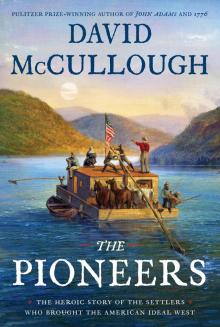 The Pioneers
The Pioneers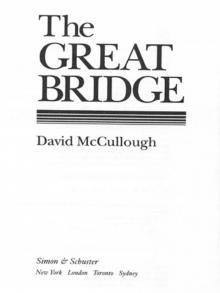 The Great Bridge: The Epic Story of the Building of the Brooklyn Bridge
The Great Bridge: The Epic Story of the Building of the Brooklyn Bridge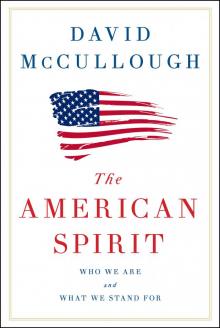 The American Spirit
The American Spirit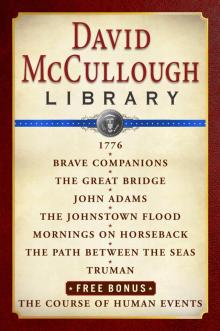 David McCullough Library E-book Box Set
David McCullough Library E-book Box Set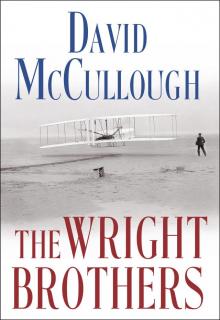 The Wright Brothers
The Wright Brothers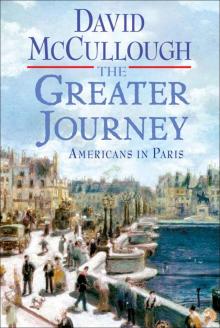 The Greater Journey
The Greater Journey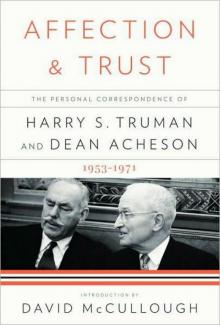 Affection and Trust: The Personal Correspondence of Harry S. Truman and Dean Acheson, 1953-1971
Affection and Trust: The Personal Correspondence of Harry S. Truman and Dean Acheson, 1953-1971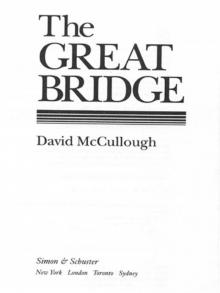 The Great Bridge
The Great Bridge